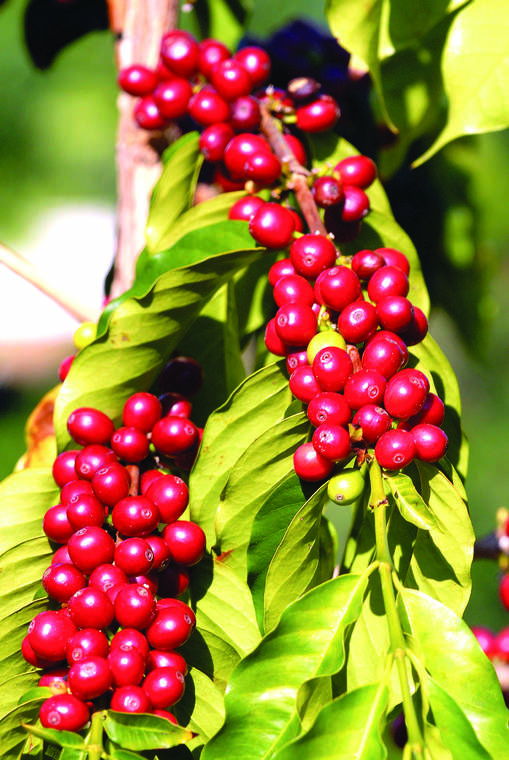HILO — Three Kona coffee farmers have turned to science to prove their case against major retailers and producers who they say are mislabeling their products as authentic Kona coffee.
The farmers, who own Rancho Aloha, Kanalani Ohana Farm and Smithfarm, provided test results of a litany of chemical analyses in a May 21 amended complaint to their lawsuit in U.S. District Court in Seattle. The group is asking for the case to be certified as a class-action lawsuit.
The tests, which compared relative concentrations of strontium, zinc, barium, nickle, cobalt and manganese, show suspect coffee brands varied widely from a baseline of known Kona coffee that was set by 100 samples.
In addition, the amended complaint states, only 2.7 million pounds of authentic green Kona coffee is grown annually, but more than 20 million pounds of coffee labeled as “Kona” is sold at retail.
“That is physically impossible; someone is lying about the contents of their ‘Kona’ products,” the complaint states.
The chemical composition of coffee beans is derived from the particular soil they’re grown in. Kona coffee has long been prized for its unique flavor that comes from the rich volcanic soil on the cool slopes of Mauna Loa and Hualalai.
The farmers are suing 21 major retailers including Walmart, Safeway and Costco and producers including Mulvadi Corp., Hawaiian Isles Kona Coffee Ltd. and Copper Moon Coffee LLC, saying they are falsely labeling the coffee as Kona. This is flooding the market and lowering the public’s enthusiasm for true Kona coffee, the plaintiffs said.
“Plaintiffs bring this action against coffee distributors, wholesalers and retailers who for years have wrongfully profited from the goodwill and reputation associated with the geographic region of Kona by passing off ordinary commodity coffee as ‘Kona’ coffee. Defendants’ deceptive practices have flooded the market with counterfeit ‘Kona’ coffee products, injuring honest Kona farmers,” the lawsuit states.
Judge Robert S. Lasnik, in an order filed Friday, expects a 10-15 day trial. He set a trial date of Nov 2, 2020.
The coffee supplier defendants, in a June 5 motion to dismiss the lawsuit, don’t contest the validity of the chemical tests, or even mention them. The plaintiff’s attorney, Paul Richard Brown, of Karr Tuttle Campbell of Seattle, stands by the evidence.
“Counsel would not file a pleading without a strong, good faith, basis for the admissibility regarding the claims in evidence to support the allegations,” Brown said Tuesday in a telephone interview.
But defendants say the complaint isn’t specific enough to meet the minimal pleading standards.
“Because Plaintiffs’ claims are based in fraud—indeed, Plaintiffs dramatically allege that ‘someone is lying,’ (federal law) requires Plaintiffs to plead facts ‘with particularity,’” the defendants’ motion says. “This means that Plaintiffs must identify the time, place and specific content of the allegedly false representations, as well as how the representations are fraudulent. Plaintiffs have not done this. Instead, they have made clear that their claims are based on unspecified products bearing unspecified labels in addition to the ‘examples’ they identified.”
The suppliers also say there’s no law prohibiting them from labeling coffee as “Kona” if it’s sold out of state. The only law, they say, is a Hawaii law that applies only in Hawaii and prohibits coffee being sold as Kona coffee if it contains less than 10% Kona coffee by weight. The law allows the term “Kona blend” for coffee containing 10% or more Kona beans.
Because this lawsuit applies to coffee labeled “Kona” anywhere, the plaintiffs are relying on a section of federal code known as the Lanham Act that covers trademark infringement, trademark dilution and false advertising, the defendants said.
The suppliers say “Kona” is not a trademarked name, so the law shouldn’t apply.
The lawsuit seeks compensation for lost profits, the profits of the defendants turned over to the plaintiffs and class, payment for a national advertising campaign to try to restore Kona coffee’s damaged reputation, and an injunction prohibiting the 21 companies from labeling any coffee product as “Kona” in the future, or selling mislabeled coffee.
The coffee farmers, who have asked for a jury trial, also want defendants to deliver up for destruction “all containers, labels, signs, prints, packages, wrappers, receptacles, advertising, promotional material and products,” according to the lawsuit.
Telephone messages left with defendant attorneys were not returned by press-time Tuesday.






